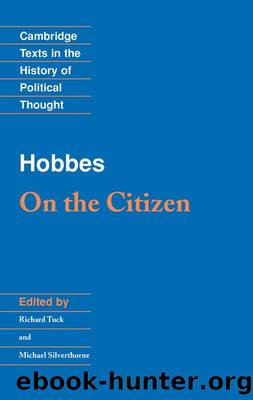Hobbes: On the Citizen (Cambridge Texts in the History of Political Thought) by Thomas Hobbes

Author:Thomas Hobbes [Hobbes, Thomas]
Language: eng
Format: epub
Publisher: Cambridge University Press
Published: 1998-08-20T06:00:00+00:00
* * *
1 A double play on words: he has the debt of a âfoster-childâ (alumnus) as to the one who âlooked afterâ him (alendo) and the debt of a âslaveâ (servus) as to the one who âsavedâ (conservavit) him.
2 For the meaning of âsectionâ here, see v.4 n. 3.
Chapter X
Comparison of the disadvantages of each of the three kinds of commonwealth
1. Comparison of the natural state with the civil state. 2. The advantages and disadvantages of the ruler and of the citizens are the same. 3. In praise of Monarchy. 4. The government of one man is not unfair simply on the ground that one man has more power than all the rest. 5. Rejection of the view of those who say that a commonwealth cannot consist of a Master with slaves. 6. Exactions are worse under the rule of the people than under a Monarch. 7. Innocent citizens are less liable to punishment under a Monarch than under the people. 8. The liberty of individual citizens is no less under a Monarch than under the people. 9. It is not a disadvantage to the citizens that they are not all allowed to take part in public deliberations. 10. It is a bad thing to entrust civil deliberations to large gatherings because of most menâs ignorance. 11. Because of eloquence. 12. Because of faction. 13. Because of instability in the laws. 14. Because of a lack of discretion. 15. These disadvantages are integral to Democracy, because men naturally love to have a reputation for sagacity. 16. The disadvantages for a commonwealth from a boy-king. 17. An indication of the superiority of Monarchy is the authority of the generals of an Army in the field. 18. The best state of the commonwealth is when the citizens are the inheritance of the ruler. 19. The nearer Aristocracy is to Monarchy, the better it is; the further away, the worse.
1. We have explained what Democracy, Aristocracy and Monarchy are. We must now compare them to see which of them is more suited to preserve the citizensâ peace and secure advantages for them. But first let us compare the advantages and disadvantages [commoda & incommoda] of the commonwealth in general, so that no one will believe it would be better for everyone to live at his own discretion than to make a commonwealth at all. Outside the circumstances of a commonwealth [statum civitatis] each man does indeed have the most complete liberty, but it does him no good. And the reason is that he who does all things of his own free will because he has his liberty, also suffers all things at the will of others, because they have their liberty. But once a commonwealth is formed, every citizen retains as much liberty as he needs to live well in peace, and enough liberty is taken from others to remove the fear of them. Outside the commonwealth every man has a right to all things, but on the terms that he may enjoy nothing.
Download
This site does not store any files on its server. We only index and link to content provided by other sites. Please contact the content providers to delete copyright contents if any and email us, we'll remove relevant links or contents immediately.
| Anthropology | Archaeology |
| Philosophy | Politics & Government |
| Social Sciences | Sociology |
| Women's Studies |
The remains of the day by Kazuo Ishiguro(8999)
Tools of Titans by Timothy Ferriss(8396)
Giovanni's Room by James Baldwin(7346)
The Black Swan by Nassim Nicholas Taleb(7129)
Inner Engineering: A Yogi's Guide to Joy by Sadhguru(6795)
The Way of Zen by Alan W. Watts(6614)
The Power of Now: A Guide to Spiritual Enlightenment by Eckhart Tolle(5781)
Asking the Right Questions: A Guide to Critical Thinking by M. Neil Browne & Stuart M. Keeley(5775)
The Six Wives Of Henry VIII (WOMEN IN HISTORY) by Fraser Antonia(5515)
Astrophysics for People in a Hurry by Neil DeGrasse Tyson(5190)
Housekeeping by Marilynne Robinson(4447)
12 Rules for Life by Jordan B. Peterson(4304)
Ikigai by Héctor García & Francesc Miralles(4274)
Double Down (Diary of a Wimpy Kid Book 11) by Jeff Kinney(4272)
The Ethical Slut by Janet W. Hardy(4253)
Skin in the Game by Nassim Nicholas Taleb(4248)
The Art of Happiness by The Dalai Lama(4130)
Skin in the Game: Hidden Asymmetries in Daily Life by Nassim Nicholas Taleb(4007)
Walking by Henry David Thoreau(3962)
